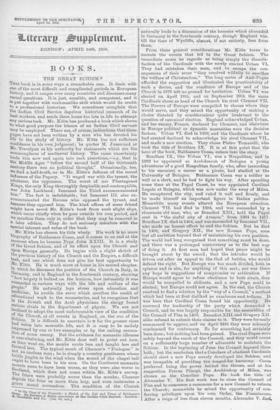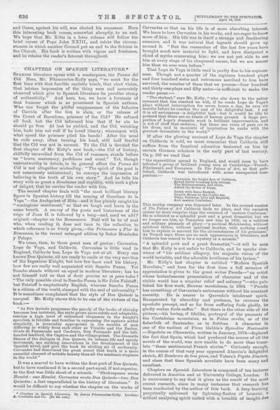BOOKS.
THE GREAT SCHISM.*
This book is in some ways a remarkable one. It deals with one of the most difficult and complicated periods in European history, and it ranges over many countries and discusses many varied questions. It is just, sensible, and competent, and it
put together with workmanlike skill which would do credit
to a professional historian. We sometimes complain that the Indian Civil Service deprives historical research of its best workers, and sends them home too late in life to attempt anY serious task. Mr. Kitts has produced a book which shows, to what good purpose the leisure of an Indian Civil servant may be employed. There are, of course, indications that these Pages have not been written by a man who has devoted his life to the study of history. Mr. Kitts has not sufficient Confidence in his own judgment; he quotes M. jusserand or Mr. Trevelyan as his authority for statements which are the commonplaces of mediaeval history. The same uncertainty leads him now and again into rash assertions,—e.g., that in the Middle Ages "before the second half of the thirteenth century there was no political thought." Occasionally, too, We find a half-truth, as in Mr. Kitts's defence of the moral influence of the Papacy. "It waged war with the tyrant, the adulterer, the oppressor. The worst of our Plantagenet lings, the only King thoroughly despicable and contemptible, ;vas John Lacklaud; Innocent the Third excommunicated IIhn," The fact is indubitable; but Innocent III. also ex- communicated the Barons who opposed the tyrant, and because they opposed him. The kind offices of some friend 'II:tight have saved Mr. Kitte's book from elicit slight slips, Which occur chiefly when he goes outside his own period, and We mention them only in order that they may be removed in a later edition. They do not seriously interfere with the special interest and value of the book.
Mr. Kitts has chosen his title wisely. His work is no mere
'biography of Baldassare Cossa, and it comes to an end at the nloment when he became Pope John XXIII. It is a study of the Great Schism, and of its effect upon the Church and uPon Europe generally. He begins with a slight sketch of ths previous history of the Church and the Empire, a difficult task, and one. Which -does not give his best opportunity to 241. Kitts. He is much more at home in his second chapter, in Which he discusses the position of the Church in Italy, in Germany, and in England in the fourteenth century, showing " Low largely it bulked on the horizon, how intimately it was connected in various ways with the life and welfare of the People." Ho naturally lays stress upon education and cledioine; he avoids the error which ascribes the credit of "ducational work to the monasteries, and he recognises that '4 the Jewish and the Arab physicians the clergy found 8.erious rivals in the department of physic. We are not 133;crmed to adopt the most unfavourable view of the condition the Church, at all events in England, on the eve of the .„'clliam. It is difficult to ascertain hc w far the grosser vices ad eaten into monastic life, and it is easy to be unduly
Pressed, by one or two examples or by the railing accusa-
11 of some enemy. But the evidence for monastic idleness cverwhelming, and Mr. Kitts does well to point out how, as time went on, the monks wrote less and taught less and r_ar.reed less. The typical monk of Chaucer 's " Prologue " is nt_ an unclean man; ho is simply a. country gentleman whose Jingles in the wind when the sound of the chapel bell cuilight to have been in his oars. On the Continent monastic _cortals seem to have been worse, as they were also worse in
land, which does not come within Mr. Kitts's survey.
e friars were probably worse than the monks; Chaucer depicts the friar as more than lazy, and even insinuates a gillye moral accusation. The condition of the Church 0* rs, the BYDays of tho Councils : a SIcetoh of tho Life and Times of Baldaasar A. e
Constable Eustaeo J. K ti
Kitts, sometime of the Indian Civil Service. London: and Co. [10s. Gil. uot..3
naturally leads to a discussion of the heresies which abounded in Germany in the fourteenth century, though England was, till the time of Wycliffe, almost, if not entirely, free from them.
From these general considerations Mr. Kitts turns to narrate the events that led to the Great Schism. The immediate cause he regards as being simply the dissatis- faction of the Cardinale with the newly elected Urban VI. They had mistaken their man, and to escape the con- sequences of their error "they resolved wilfully to sacrifice the welfare of Christendom." The long series of Anti-Popes afforded the suggestion and illustrated the practicability of such a device, and the condition of Europe and of the Church in 1378 left no ground for hesitation. Urban VI. was elected on April 180, and on September 20th the same Cardinals chose as head of the Church his rival Clement VII. The Powers of Europe were compelled to choose whom they would serve, and they seized the opportunity of making a choice dictated by considerations quite irrelevant to the question of canonical election. England acknowledged Urban, and her enemy, France, -declared for Clement, and elsewhere in Europe political or dynastic necessities were the decisive factors. Urban VI. died in 1389, and the Cardinals whom he had created declined to acknowledge his rival Clement VII, and made a new election. They chose Pietro Tomacelli, who took the title of Boniface IX. It is at this point that the hero of the book, Baldassare Coma, enters into the story.
Boniface IX., like -Urban 'VI., was a Neapolitan, and in 1392 lie appointed as Archdeacon of Bologna a young adventurer of a good Neapolitan family, who, after (according to his enemies) a career as a pirate, had studied at the University of Bologna. Baldassare Coosa was a soldier as well as a clerk, and he had to fight his way. After spending some time at the Papal Court, he was appointed Cardinal Legato at Bologna, which was now under the sway of Milan. He recaptured the city, and ruled it well and firmly, and he made himself an important figure in Italian politics. Meanwhile many events altered the European situation. Clement VII, had died in 1394, and was succeeded by a strenuous old man, Who, as Benedict XIII., held the Papal seat in "the sinful city 4:4 Aveuon" from 1394 to 1417. Boniface IX. died in 1404, and was succeeded by Innocent VII., who made an honest effort to end the Schism. But he died in 1406, and Gregory XII., the new Roman Pope, soon lost all ambition beyond that of maintaining his own position. The world had long recognised that something must be done, and there was a prolonged controversy as to the best way of doing it. At first men had hoped that peace might be brought about by the sword ; that the intruder would be driven out after an appeal to the God of battles, who would defend the right. But Europe was too much divided, both in opinion and in aim, for anything of this sort ; nor was there any hope in suggestions of compromise or arbitration. If Europe would agree to refuse obedience to both rivals, they
would be compelled to abdicate, and a new Pope could be elected; but Europe could not agree. In the end, the Church
resolved to find a solution by the "way of a Council," a method which had been at first disliked as cumbrous ancl„tedious. It was here that Cardinal Comm found his opportunity. He assumed the leadership of the party which demanded a Council, and he was largely responsible for the assembling of the Council of Pisa in 1409. Benedict XIII. and Gregory XII,
alike refused to submit their claims to it. They were formally summoned to appear, and on April 24th they were solemnly
condemned for contumacy. So far something had certainly
been done ; but nothing had been gained. The rival Popes were safely beyond the reach of the Council, and they could count on a sufficiently large number of adherents to maintain the
Schism. In the beginning of June the Council deposed them both ; but the resolution that a Conclave of obedient Cardinals should elect a new Pope merely developed the Schism, and
was incapable of providing the longed-for harmony. Cossa preferred being the power behind the throne, and at his suggestion Potrus Filargi, the Archbishop of Milan, was chosen as the Conciliar Pope. He took the title of Alexander V. His first work was to close the Council of
Pisa and to announce a summons for a new Council to refortu. the Church ; meanwhile he seized the opportunity of con- ferring privileges upon his own Order, the Franciscans. After a reign of less than eleven months, Alexander V. died,
and Cossa, against his will, was elected his successor. Here this interesting book comes, somewhat abruptly, to an end. We hope that Mr. Kitts in a later volume will follow the brief career of Pope John XXIII., and relate the circum- stances in which another Council put an end to the Schism in the Church. His book is written with vigour and freshness, and he retains the reader's Interest throughout.























































 Previous page
Previous page